- Home
- D. M. Turner
Alpha Page 2
Alpha Read online
Page 2
Ian raised his head further to look at his legs. Past a fur-covered body, two more paws. And a bushy tail. He let his head fall back to the ground.
A nightmare. It’s just a nightmare. You’re dreaming about that wolf that attacked you. That’s all. He closed his eyes tight. You can wake up anytime now, Ian.
When he opened his eyes again, he looked. Still four paws, a tail, and a furry body. Had he been cursed? What if he’d wandered into the territory of some witch or something?
Don’t be ridiculous. Now isn’t the time to surrender to paranoid superstition màthair and athair left in the homeland before you were even born. There has to be a logical explanation.
He clamored to his feet and stood with legs splayed and wobbly. Alright, genius. What explanation can you come up with that’s logical?
Gaze down, he studied all four feet then concentrated on moving them one at a time. They did exactly as he commanded, moving one by one. Not so different from crawling around on hands and knees. Mostly. Sort of. If he overlooked the fact he had paws on the ground instead of hands and knees. His clothes lay in shreds all around him.
Was he truly a wolf?
Ian glanced toward the river. Moonlight danced across it. There was a spot against a fallen tree where the water was still. On shaky, uncertain legs, he made his way to it and stared down at his reflection.
The full moon’s light revealed the broad head, small prick ears, and long muzzle of a gray wolf.
He blinked a few times and looked again, but the image didn’t change. He raised his upper lip to expose his teeth. Large, gleaming white canines flashed at him. The canine teeth were doubled. A trait he’d inherited from his athair that had been in the family for generations. Wolf or not, it was definitely him.
He backed away and looked up at the full moon.
It sang to him, humming along every nerve in a way that was both unsettling and comforting.
The ambiguity frightening, he turned and ran into the trees, stumbling a bit over his own feet, and returned to the fire, hunkering close to it.
Now what?
His stomach growled. The scent of blood drew his gaze to the butchered deer. Eat. Then worry about the rest.
* * *
Monday, July 10, 1865
Ian stared into the still pool at the edge of the Licking River. He’d stayed in or near the campsite for the past two nights and full day, at a loss for where to go or what else to do. The full moon had passed the morning before. The wolf remained in his reflection. He’d finished off the deer carcass that very morning, so his belly was full at least.
I’m human. Not a wolf. This isn’t what I was born to be. I can’t live like this.
He sank to his belly at the water’s edge and laid his head on his paws. Human, not wolf. There has to be a way to reverse this. How?
Pain rippled through his muscles and bones then intensified. Not again! What would he become this time?
Pain shifted and settled more quickly, without becoming full-blown agony. He lay panting on the riverbank then opened his eyes to assess the damage. To Ian’s surprise, human hands rose to his bidding. He sat up, unsteady but the motion very human, and ran quick hands over his body. No wounds. No scars. Perfectly toned muscle. Unblemished skin. He peered into the still water. His own face stared back.
Was hydrophobia supposed to have such effects? He racked his brain for everything he’d heard about the disease. Pain. Check. Fever. Not that he’d noticed. Fits. Hm. Was that the pain? No one had mentioned turning into a wolf among the symptoms.
Oh, wait. Hallucinations and delusions. Hadn’t someone said people suffered from those with such diseases? Maybe the wolf had been a rabies-induced delusion? Yes, that made sense. The final stage of the disease brought death. In the meantime, could he infect others?
Should he go home? If he warned his family that he’d been attacked by a wolf and contracted the horrid disease, they could safeguard themselves to ensure he didn’t infect them. Right?
No. He couldn’t put them at risk. He should stay as far from people as possible. If he inflicted this horrible thing on someone else, he wouldn’t be able to forgive himself. He wasn’t likely to make it home anyway, if the disease killed as quickly after symptoms started as he’d heard. Too many days travel remained to reach Parkersburg, West Virginia.
Resigned to his fate, Ian returned to camp, pulled the last set of clothes he owned from his pack and pulled them on. Then he scrounged up wood for the fire and settled next to it to wait for the inevitable.
* * *
Saturday, July 22, 1865
(Twelve days later)
Shouldn’t he be dead? Or at least getting worse? Instead, he’d never felt better or stronger. Ian had counted the days since the wolf had been visited upon him, waiting for death. Nothing had happened. At least, nothing bad. No more hallucinations or delusions about being a wolf. No more agonizing pain tearing his head and body apart.
The fact he didn’t carry so much as a minute scar as evidence of the attack made him wonder if the whole thing had been the result of eating a bad squirrel. Maybe the wolf had never actually attacked, just a bad dream or illness-induced hallucination. He could go home and forget it ever happened.
Reason argued the case, but a couple of developments threw doubt into the mix. His sense of smell had gotten stronger. Scary strong. Also, his hearing had become much more acute. Those had resulted in a greatly heightened awareness of his surroundings and the movements of the creatures he shared the woods with. That had made the hunt for food easier. None of that seemed dangerous though, at least not to humans. Game was another matter, and not a concern.
Restlessness often kept him company, an uneasy churning in his gut that he couldn’t shake. He’d taken to going for long walks when it struck, which seemed to settle it. He never wandered far from camp, afraid he might run into other people.
Another change had occurred that morning. A heavy weight rested over his heart and mind, making him long to curl up in a dark hole and not come out. He’d built up the fire, despite the warmth of the day. Other than making him sweat more, that hadn’t chased away the darkness.
He didn’t feel sick, exactly. More like the depression that had hovered at times during the war when too many days of battle had streamed together with too little sleep in the midst of them. He’d slept fine, though, so that couldn’t be it.
Thoughts of his parents had lurked close. They’d known when he’d leave Louisville to head home and be watching for him. If he never went home, they’d wonder for the rest of their lives what ill had befallen him. A band of pain tightened around his heart, reminiscent of the time he’d gotten a leg caught in barbed wire. He needed to get home.
Ian crouched at the river’s edge for a drink, and a reflection caught his eye. He craned his neck to look up at the sky.
The new moon climbed higher into the blue, only a sliver of white crescent visible. Faint whispers drifted earthward.
Head cocked, he listened.
Give up. There’s no hope, so why keeping fighting? You’re only prolonging the inevitable. You will die, or you will kill. There are no other choices.
He frowned, and a shiver ran up his spine.
You’re a threat to your family. You can never go home again. You have nothing left.
The truth of those words tightened the barbed wire around his heart. He lowered his gaze and closed his eyes, clinging to the merest scrap of optimism. No. As long as I’m alive, there’s hope. I could still beat this.
You’re only fooling yourself.
Taking a deep breath, Ian shook his head and got to his feet. “No!” Ignore the moon’s words. It’s wrong. He turned and ran into the trees. Get away from it.
He stopped long enough to toss what few items he had into his pack, threw it over his shoulder, grabbed the rifle, and crossed the river at a run. Ten days, maybe a few more, and he’d be home. He couldn’t let the moon keep him away. Fight it!
* * *
South of Parkersburg, West Virginia
Sunday, August 6, 1865
Ian stopped to study the ground and buildings below the small rise. Finally. Days of trekking over rolling hills, a bit of rough terrain, and several rivers in the plateau on the west side of the Allegheny Mountains. Home ground.
It had taken a couple of days to outrun the dark thoughts the new moon had tried to plant in his heart, but he’d finally escaped. As he’d thought about it in the days that followed, it seemed ridiculous. He snorted even as he trotted down the hill toward home. True paranoia there. Thinking the moon spoke to him. Wouldn’t his parents have a good laugh about that?
Then again, he probably should keep all that had happened since leaving Louisville to himself. His parents would think he’d returned from the war touched in the head. They might not be wrong, but it would be best to keep that fact to himself.
He came over one last small hill, and the farm spread out before him.
His athair, Duncan Campbell, was out with the cattle one field over, probably checking the spring calves as he did every fall.
His màthair, Maisie, worked in the garden, as she had as far back as Ian could remember. She straightened and rubbed the small of her back, glancing up the hill at the same time. A hand shielded her eyes then she waved and called out, “He’s home!” She dropped the hoe and ran toward him.
A momentary frown took the smile from Ian’s face. He shouldn’t have been able to hear what she’d hollered. She hadn’t been speaking to him, clearly, but he’d heard it as though she were less than half that distance.
He shook his head and trotted down the hill to meet her, stopping moments before she reached him to drop his pack and set his gun against it. Then he swept her into his arms for a hug. His athair wasn’t far behind her.
After a tearful greeting, she stepped back and laughed, leaving dirt streaks across her face in wiping away tears. “We expected ye home days ago!”
“I know. I’m sorry. I was delayed.” Best not to go into that. “But I’m home now.”
* * *
Monday, August 7, 1865
It hadn’t taken long for athair to put him to work. Ian chuckled as he helped repair the roof of the barn. He’d intended to help his màthair with the milking and retrieving eggs, but for some odd reason, the animals had gotten one look at him and spooked. Chickens had scrambled every which way, and the milk cow had nearly broken her fool neck trying to get free of her halter. He’d backed away and left them for his màthair to deal with.
“It makes no sense.”
He glanced at the man working beside him. “What?”
“Th’ way those animals acted. Th’ chookies, sure. They havenae th’ sense to come out of th’ rain, but Rona has never given a bit of trouble. Ah wonder whit got into her.”
Ian shrugged. “I have no idea.” He’d seen a horse act that way once, when a vicious dog had gone after it, biting at its legs. It had almost killed itself trying to get away. But he wasn’t exactly a vicious dog. Uneasiness put a knot in his stomach.
His athair eyed him speculatively. “Ye seem different.”
“In what way?” The hair on the back of his neck rose, and he suppressed a shiver.
“Ah’m not sure.” He cocked his head to consider Ian with close scrutiny. “Ah expected ye to be all grown up, but there’s... an intensity Ah hadnae expected.”
“I ain’t sure what to say. I can’t explain it.” He ducked his head to his work. Had his parents’ accents always been so strong? Why hadn’t he noticed that before? Had he sounded like that when he’d gone to war?
The older man chuckled. “Ain’t? Ye sound like them.”
“Who?” He cocked his head.
“Others aroond haur.”
“The only conversation I’ve had the past four years is with other soldiers, so I guess that’s to be expected.” Not to mention, he’d made a concerted effort to learn their way of speaking so they’d stop looking at him strangely. He’d gotten tired of having to repeat himself and explain because the other men hadn’t understood things he’d said.
“Hm.” His athair nodded and went back to work.
They worked until the sun kissed the western horizon and màthair hollered, “Dinner!”
They washed up and went inside.
Partway through eating, Ian’s stomach tightened almost painfully, and a peculiar restlessness fell over him.
The wood stove in the corner suddenly radiated a lot more heat.
He needed fresh air. “Excuse me.” He didn’t wait for either of his parents to acknowledge his request but got up from the table and went outside. On the front porch, he took a deep breath.
The ache moved from his stomach to his shoulders.
Maybe a walk would ease it off.
He hopped the short distance to the ground and walked around the side of the house toward the garden.
Faint whispers pulled him toward the east, where a dim light kissed the horizon. In moments, the full moon’s upper edge appeared.
Agony swept through him. He dropped to his knees. Oh, no. Not again. He bit back a yell of both pain and frustration, afraid of alerting those in the house. He stripped off the shirt then collapsed to the ground, writhing in the grass.
“Ian! Duncan, come quickly!”
Oh, God, no. Please!
His màthair ran to his side and dropped to her knees. Her hands gently gripped his shoulders even as his athair joined them, kneeling on Ian’s other side.
He groaned. The pain intensified. The moon’s whispers gained strength, and music played along every nerve ending. When the agony stopped, he panted in the warm night air. After a few moments, he became aware that his parents had moved and stood a few feet away, horror etched on their faces.
Ian forced himself to his feet and shook, chasing away the last of the aches. Then he raised his head to look at the people who’d been most precious in his life. The ones he’d gone to war and fought for. He took a step toward them. They gasped and shrank back.
Head down, gaze lowered, he turned and ran, through the garden and into the hills.
* * *
Tuesday, August 8, 1865
The full moon had set. The music had stopped. Back in human form, though he wasn’t entirely sure how he’d managed it, Ian returned to the house. His clothes still laid in the yard where they’d fallen from him the night before. He pulled them on, studied the quiet house, and sighed. Time to face his parents.
Slow, hesitant steps took him to the front door. He opened it, expecting his athair to be on the other side, prepared to shoot him. Instead, his parents sat together at the table, heads bowed, eyes closed. At the creak of the door hinges, they looked up. He swallowed hard and stepped inside.
“Whit happened to ye, boy?” The older man’s expression held only confusion and worry.
“I don’t know. I was attacked by a wolf a month ago. I convinced myself it was a bad dream.” Tears filled his eyes. “I guess I can longer lie to myself.”
“None can ken thes.”
“I know.” He nodded. If anyone knew, found out what he was, he’d be hunted. He wouldn’t try to convince himself otherwise. “I have to leave.” The certainty of that had settled in as he’d walked back to the house, stark-naked in the early morning air.
“Leave?” His màthair shook her head, tears gathering. “No.”
“Yes.” Ian shook his head. “I can’t be sure I won’t hurt you, and I won’t risk it. I’d rather die.”
“Ah kin.” His athair nodded. “Whaur will ye go?”
“West, I guess. I hear there’s a lot of empty territory. I’d be safe, as will everybody else.”
The older man nodded again. Then he got to his feet and hugged Ian so hard, it made him want to cry. His athair had never hugged him quite so fiercely before, even when he’d gone to war and might not return. They all knew there’d be no return this time. Death might not come, but Ian would nev
er be home again.
His màthair ran from the room, sobbing.
Ian watched her go, battling tears of his own. “I better get a few things to take with me.”
“Take whatever ye need.”
He went to his room, stuffed his pack full of clothes, and shouldered the bag. A small metal box sat on the table next to the bed. His money tin. He removed a few dollars and shoved it into a pocket then picked up the box and carried it into the outer room. He pushed it into his athair’s hand. “I want you to have this.”
The man frowned and opened it. “Ye might need it.”
“I’ll work for more if that’s the case. I’ve got a few dollars in my pocket.” He glanced at the door to his parents’ room. “I’ll write from time to time if I’m near an express office, so you know where I am and that I’m well.”
The older man nodded.
Before courage and good intentions failed, Ian left. Tears streamed down his face as he headed west, but he forced himself not to look back and locked his gaze on the western horizon.
Lord, what future exists for a man like me? I guess I need to worry about that, after all.
* * *
Home of Ian Campbell, Pack Alpha
Campbell Wildlife Preserve
Outside Flagstaff, Arizona
Sunday, April 22, 2017
“That’s so horribly sad.” Tanya’s eyes glistened with tears, even as a couple made tracks down her cheeks. “You really had to leave your family like that even though they didn’t reject you?”

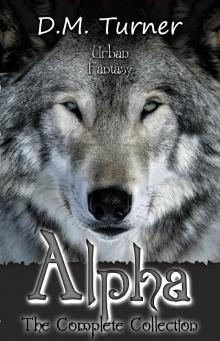 Alpha
Alpha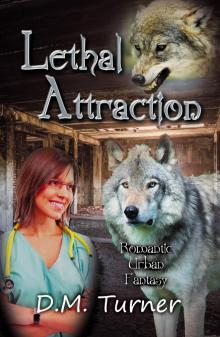 Lethal Attraction
Lethal Attraction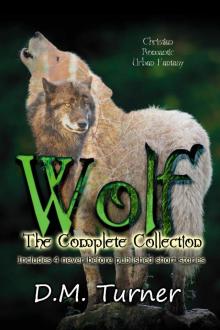 Wolf
Wolf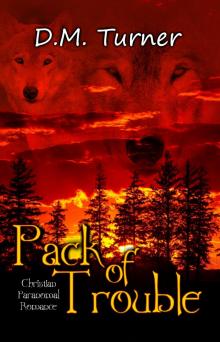 Pack of Trouble
Pack of Trouble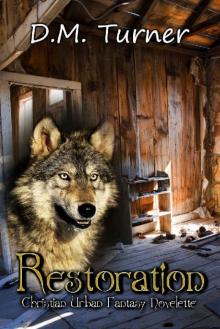 Restoration: Christian Urban Fantasy
Restoration: Christian Urban Fantasy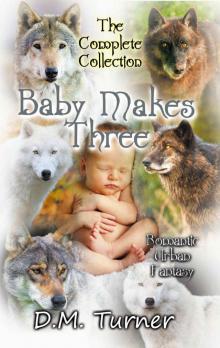 Baby Makes Three Collection
Baby Makes Three Collection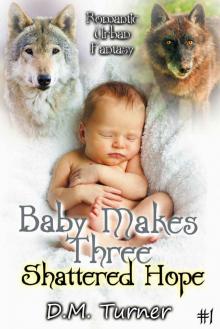 Shattered Hope
Shattered Hope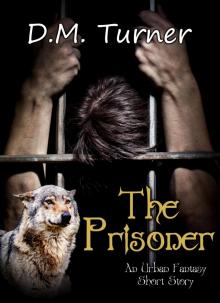 The Prisoner
The Prisoner